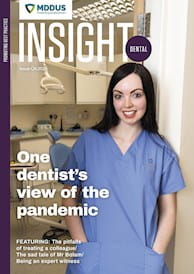BACKGROUND
Mrs P was in a road traffic accident just over a year ago and suffered brain damage resulting in short-term memory impairment. She lives in Scotland and attends her local dental surgery for a check-up, accompanied by her husband.
Dr L examines the patient and notes decay in two upper molars, causing pain and swelling. Restoration is advised and an appointment is made for later that week.
Dr L is concerned that Mrs P does not appear to have capacity to give informed consent for the necessary treatment. Mr P agrees to sign a consent form on behalf of his wife but informs Dr L that he does not have welfare power of attorney.
Dr L contacts MDDUS for advice in the matter.
ANALYSIS/OUTCOME
A dental adviser offers detailed written guidance to Dr L. The lack of a welfare guardian for Mrs P does complicate matters, as her husband’s signature will not grant consent to treatment but merely confirm that he has read the information provided. The relevant legislation in Scotland is the Adults with Incapacity (Scotland) Act 2000. Adults are presumed to have capacity to consent to medical or dental treatment unless it can be proved otherwise and the Act sets out principles that must be adhered to in such cases.
In short, it states that the treatment must benefit the patient, should be the minimum necessary to achieve the purpose, and must take account of the present and past (if known) wishes of the patient. It should also take account of the views of others who might have an interest in the patient’s welfare.
Part 5 of the Act allows for a welfare guardian or attorney to consent to treatment if granted this power. Should no guardian or attorney have been appointed then an appropriately trained doctor or dentist can issue a certificate of incapacity for the medical or dental treatment considered appropriate. Only individuals who have undergone specific training can sign a Section 47 certificate.
Dr L is advised that if in his view the patient does not have capacity to consent, Mrs P should then be examined by a clinician who has appropriate Section 47 training.
Referral to a special care dentistry clinic might be considered if deemed appropriate in the circumstances, given that clinicians in such a unit would have more experience and expertise in dealing with patients with short-term memory loss. Crucial is the need for someone who is able to sign a Section 47 certificate.
KEY POINTS
- Ensure compliance with relevant national legislation in treating patients who may lack capacity to make decisions.
- Treatment decisions must take account of the present and past wishes of the patient.
- Consult others with a valid interest in the patient’s welfare.
This page was correct at the time of publication. Any guidance is intended as general guidance for members only. If you are a member and need specific advice relating to your own circumstances, please contact one of our advisers.
Read more from this issue of Insight Dental

Save this article
Save this article to a list of favourite articles which members can access in their account.
Save to library